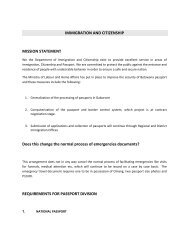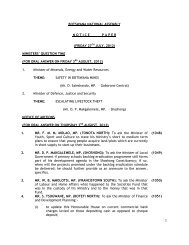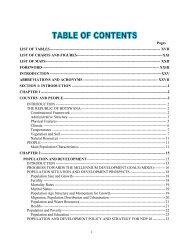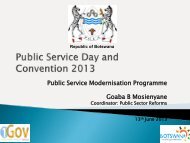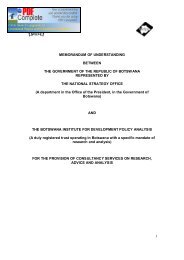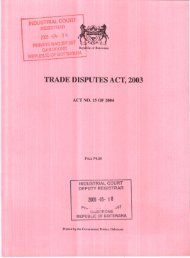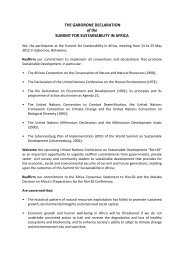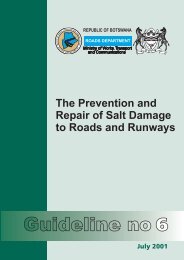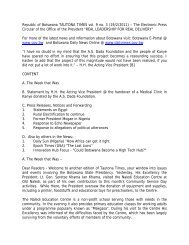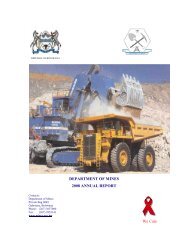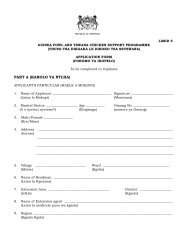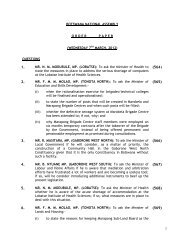2012 Budget Speech - Government of Botswana
2012 Budget Speech - Government of Botswana
2012 Budget Speech - Government of Botswana
You also want an ePaper? Increase the reach of your titles
YUMPU automatically turns print PDFs into web optimized ePapers that Google loves.
Republic <strong>of</strong> <strong>Botswana</strong><br />
<strong>2012</strong> BUDGET SPEECH<br />
By Honourable O.K. Matambo<br />
Minister <strong>of</strong> Finance and Development Planning<br />
Delivered to the National Assembly on 1 st February <strong>2012</strong><br />
Website: www.finance.gov.bw<br />
Price: P15-00<br />
Printed by the <strong>Government</strong> Printing and Publishing Services, Gaborone
Table <strong>of</strong> Contents<br />
I. INTRODUCTION ........................................................................................................................ 1<br />
II. INTERNATIONAL AND REGIONAL ECONOMIC REVIEW ........................................ 3<br />
International Economic Review ...................................................................................................... 3<br />
Regional Economic Review ............................................................................................................. 4<br />
III. DOMESTIC ECONOMIC REVIEW ..................................................................................... 4<br />
Economic Growth ............................................................................................................................. 4<br />
Inflation and Monetary Policy ........................................................................................................ 5<br />
Exchange Rate Movement ............................................................................................................... 5<br />
Balance <strong>of</strong> Payments and Foreign Exchange Reserves ................................................................. 6<br />
Trade and Investment Climate ....................................................................................................... 6<br />
Economic Outlook ............................................................................................................................ 7<br />
Population Growth ........................................................................................................................... 7<br />
Employment Issues ........................................................................................................................... 8<br />
Poverty Eradication ......................................................................................................................... 9<br />
Economic Diversification and Competitiveness ............................................................................ 9<br />
Services Sector Development......................................................................................................... 11<br />
Financial Services ........................................................................................................................... 11<br />
Private Sector Development .......................................................................................................... 12<br />
Rationalisation and Performance <strong>of</strong> Parastatals ......................................................................... 13<br />
Debt Management .......................................................................................................................... 13<br />
IV. 2010/2011 BUDGET OUTTURN........................................................................................... 14<br />
V. <strong>2012</strong>/2013 BUDGET PROPOSALS .......................................................................................... 15<br />
Revenues and Grants ..................................................................................................................... 15<br />
Recurrent <strong>Budget</strong> ........................................................................................................................... 15<br />
Statutory Expenditure ................................................................................................................... 16<br />
Development <strong>Budget</strong> ...................................................................................................................... 16<br />
Maintenance <strong>of</strong> <strong>Government</strong> Assets ............................................................................................. 17<br />
VI. OVERALL BALANCE .......................................................................................................... 18<br />
VII. FISCAL LEGISLATION ....................................................................................................... 18<br />
VIII. CONCLUSION .................................................................................................................... 18<br />
i
I. INTRODUCTION<br />
1. Madam Speaker, I have the honour this afternoon to present to the National Assembly<br />
budget proposals for the financial year <strong>2012</strong>/2013.<br />
2. Madam Speaker, in keeping with the principle <strong>of</strong> transparency in the preparation <strong>of</strong><br />
the <strong>Budget</strong>, each year my Ministry prepares a <strong>Budget</strong> Strategy Paper whose aim is to<br />
set out the context <strong>of</strong> the budget for the coming financial year. The <strong>Budget</strong> Strategy<br />
Paper for <strong>2012</strong>/13 was shared widely through the fora <strong>of</strong> <strong>Budget</strong> Dipitso in July and<br />
August 2011. Besides the <strong>Budget</strong> Dipitso for Members <strong>of</strong> Parliament and general<br />
stakeholders, which included amongst others, trade unions, private sector, academia,<br />
and news media, the 2011 consultation was extended to Local Authorities and Ntlo Ya<br />
Dikgosi, specifically because <strong>of</strong> their roles as representatives <strong>of</strong> various groups <strong>of</strong><br />
Batswana in both the rural and urban areas.<br />
3. The economic situation in which we currently find ourselves dictates that we must<br />
operate within a severely constrained budget to satisfy the diverse needs <strong>of</strong> our<br />
society. Wide consultation is important for creating a common understanding <strong>of</strong> the<br />
issues. Every part <strong>of</strong> <strong>Government</strong> must ensure that available resources are allocated<br />
and used efficiently and effectively. To further facilitate this common understanding,<br />
the <strong>2012</strong>/13 <strong>Budget</strong> Strategy Paper gave an overview <strong>of</strong> the performance <strong>of</strong> key<br />
economic variables, the fiscal strategy and budget priorities. A webpage is available<br />
on my Ministry’s website (www.finance.gov.bw). The Strategy Paper and all related<br />
documents are freely accessible to the general public with an option for online<br />
interaction with my Ministry staff.<br />
4. <strong>Government</strong>’s priorities for the <strong>2012</strong>/13 budget continue to focus on service delivery<br />
and maintenance <strong>of</strong> existing infrastructure, while completing on-going projects such as<br />
energy generation, dams, roads and self-liquidating projects with high rates <strong>of</strong> return.<br />
These priority areas are expected to improve efficiency, create employment<br />
opportunities and foster private sector growth. I need to point out that all this is to be<br />
achieved against the backdrop <strong>of</strong> a constrained external trade and global<br />
competitiveness, prospects <strong>of</strong> declining revenues from current sources, the need to<br />
contain debt within sustainable levels, and the overall objective <strong>of</strong> balancing the<br />
budget for the <strong>2012</strong>/13 financial year.<br />
5. Madam Speaker, central to <strong>Government</strong>’s fiscal strategy is our long-standing<br />
commitment to balance the budget in <strong>2012</strong>/13, and return to modest surpluses<br />
thereafter. In order to achieve this, total expenditure in the coming financial year<br />
should not exceed revenues. <strong>Government</strong> must focus spending on high priority and<br />
high return activities, scale down spending on low return activities or programmes,<br />
and increase productivity in the delivery <strong>of</strong> <strong>Government</strong> services. Over the coming<br />
1
years, as revenue from traditional sources declines, an efficient revenue collection<br />
system that sustains <strong>Government</strong> expenditure in line with overall <strong>Government</strong> revenue<br />
will be critical.<br />
6. The reform <strong>of</strong> the company tax system introduced last year is expected to enhance<br />
compliance and have a positive effect on total revenue. Further, as a way <strong>of</strong> soliciting<br />
ideas on how to enhance our revenue base, in December 2011, my Ministry ran two<br />
Revenue Dipitso, one for Members <strong>of</strong> Parliament, and another for all Ministries and<br />
other key stakeholders which among others included, <strong>Botswana</strong> Confederation <strong>of</strong><br />
Commerce, Industry and Manpower; <strong>Botswana</strong> Council <strong>of</strong> Non - <strong>Government</strong>al<br />
Organisations; and University <strong>of</strong> <strong>Botswana</strong>. Suggestions obtained from this<br />
consultation are an important part <strong>of</strong> the development <strong>of</strong> <strong>Government</strong>’s strategy for<br />
broadening the revenue base. In doing so, we need to be careful that any additional tax<br />
reforms and incentives do not adversely affect fiscal sustainability.<br />
7. Madam Speaker, lately, there has been growing concern that the United States <strong>of</strong><br />
America (USA) and some countries in Europe, which are facing unsustainable debt<br />
levels, may lead the world economy into a double-dip recession. Should this occur,<br />
global demand particularly for luxury commodities like diamonds would fall. As a<br />
result <strong>of</strong> our high dependence on international markets, <strong>Botswana</strong> is vulnerable to any<br />
slow-down in global demand. Prudent policy choices that promote efficiency in the<br />
use <strong>of</strong> available resources as well as those that enhance development <strong>of</strong> alternative<br />
sources <strong>of</strong> revenue are therefore necessary.<br />
8. There are several alternatives from which we can obtain additional funds for<br />
development spending. Some <strong>of</strong> these include: increasing taxes; borrowing from both<br />
domestic and external financial markets; sale <strong>of</strong> public assets; and depletion <strong>of</strong><br />
<strong>Government</strong> savings or reserves. Increasing taxes has the effect <strong>of</strong> eroding disposable<br />
income, and thus making the taxpayers and investors worse <strong>of</strong>f. Borrowing beyond a<br />
sustainable limit, and sale <strong>of</strong> assets, have the potential <strong>of</strong> leading the country towards<br />
insolvency and loss <strong>of</strong> credit worthiness, as has been the case lately in some parts <strong>of</strong><br />
the Euro area. Similarly, depletion <strong>of</strong> savings would leave the country vulnerable to<br />
future shocks without the ability to cushion the impact as was possible in the past<br />
recession. Hence as a nation, we need to live within our available means, undertaking<br />
only those additional development initiatives which enhance economic growth. To this<br />
end, let me take this opportunity to inform this Honourable House that, we are almost<br />
half-way through the NDP 10 plan period, and the Mid-Term Review is scheduled to<br />
start in April <strong>2012</strong>. This review will give us an opportunity to revise the priorities and<br />
budget allocations in light <strong>of</strong> current and future needs <strong>of</strong> our society. It is therefore<br />
vital that we all take a keen interest in the review process in order to guide<br />
development initiatives in our economy.<br />
2
II. INTERNATIONAL AND REGIONAL ECONOMIC REVIEW<br />
International Economic Review<br />
9. Madam Speaker, the global economy, which at the beginning <strong>of</strong> 2011 was on a path<br />
towards recovery, is now increasingly faced with uncertainties due to substantial<br />
sovereign debt in a number <strong>of</strong> advanced economies, especially the USA and parts <strong>of</strong><br />
the Euro area. What is happening in these countries has pr<strong>of</strong>ound implications for our<br />
economy because most <strong>of</strong> our revenue comes directly or indirectly from international<br />
trade. Any slowdown in the economic activity in advanced economies will affect us<br />
negatively as well. Already we are beginning to experience the negative effects <strong>of</strong> this<br />
slow down, particularly with the sale <strong>of</strong> diamonds, and I will come back to this issue<br />
later.<br />
10. In the International Monetary Fund’s World Economic Outlook <strong>of</strong> September 2011 the<br />
projection <strong>of</strong> real economic growth for the global economy have been revised<br />
downwards to 4 percent for both 2011 and <strong>2012</strong>, from earlier projections in the range<br />
<strong>of</strong> 4.3 percent to 4.5 percent. For the major advanced economies the projection for<br />
2011 issued in September was 1.6 percent, considerably down from the rate <strong>of</strong> 3.1<br />
percent achieved in 2010. Consequently, prospects for emerging and developing<br />
economies that depend on exports to the major advanced economies have now become<br />
less certain.<br />
11. For Sub-Saharan Africa, growth for 2011 was projected to decline marginally from 5.4<br />
percent in 2010 to 5.2 percent in 2011, and to increase to 5.8 percent in <strong>2012</strong>.<br />
However, the IMF has noted that the debt overhang in the Euro area was threatening<br />
to slow down global growth even further.<br />
12. The IMF announced last week that the last year’s growth projections for <strong>2012</strong> have<br />
been reduced in the case <strong>of</strong> the Euro area from 1.1 percent to -0.5 percent, and from<br />
2.3 percent to 1.7 percent for Japan, while the expected US growth rate is unchanged<br />
at a subdued 1.8 percent. The IMF’s update also warned <strong>of</strong> the possibility <strong>of</strong> even<br />
greater reductions. With such low or negative growth rates in the major industrial<br />
countries, which are the principal international markets for our exports, the downside<br />
risks for our own growth have increased substantially. It is evident that we must adjust<br />
our own spending plans accordingly.<br />
13. The volume <strong>of</strong> world trade in goods and services, which in 2010 had started reversing<br />
the sharp drop <strong>of</strong> 2009, was projected last September to grow by 5.8 percent in <strong>2012</strong>.<br />
Consumer price inflation for advanced economies is expected to decline to 1.4 percent<br />
during <strong>2012</strong>. The good news is that while growth prospects may be constrained as we<br />
3
move into <strong>2012</strong>, pressure from imported inflation into the domestic economy is<br />
expected to be minimal.<br />
Regional Economic Review<br />
14. Madam Speaker, regional integration, market liberalisation and overall economic<br />
growth, particularly within the Southern African Development Community (SADC)<br />
are critical for enhancing <strong>Botswana</strong>’s effort towards moving from “factor driven”<br />
growth, based on mineral exports, towards a more diversified and “efficiency driven”<br />
growth. It is, therefore, encouraging to note that generally SADC Member States<br />
experienced satisfactory economic performance in 2010 and 2011. Further, the<br />
medium term prospects indicate that the region is expected to register economic<br />
growth <strong>of</strong> 5.6 percent in <strong>2012</strong>. Such positive growth increases prospects for regional<br />
trade and opens up a widow <strong>of</strong> opportunity for Batswana to invest more in exportoriented<br />
goods and services.<br />
15. Meanwhile, efforts are continuing to consolidate the SADC Free Trade Area in order<br />
to move towards a Customs Union. The immediate focus <strong>of</strong> SADC is a review <strong>of</strong> the<br />
rules <strong>of</strong> origin; completion <strong>of</strong> tariff reductions for selected products; removal <strong>of</strong> Non-<br />
Tariff Barriers; and developing a mechanism to assist Member States that are not yet<br />
in the Free Trade Area to participate therein. Other areas to be addressed include the<br />
issue <strong>of</strong> overlapping memberships where some countries are members <strong>of</strong> more than<br />
one regional organisation. Progress achieved in these areas would determine when<br />
negotiations towards the establishment <strong>of</strong> a SADC Customs Union would commence.<br />
III. DOMESTIC ECONOMIC REVIEW<br />
Economic Growth<br />
16. Madam Speaker, the latest data available from Statistics <strong>Botswana</strong> indicate that<br />
through the third quarter <strong>of</strong> 2011 most sectors contributed positively to the overall<br />
GDP growth. In real terms, GDP growth in the third quarter <strong>of</strong> 2011 was 7.8 percent<br />
compared to a growth rate <strong>of</strong> 12.5 percent recorded during the same period in 2010.<br />
The Construction sector, which had benefitted from the stimulus response to the<br />
recession, recorded a real growth rate <strong>of</strong> 24.3 percent while manufacturing, which had<br />
declined slightly during the recession, recorded strong real growth <strong>of</strong> 13.8 percent.<br />
Over the same period real GDP in the mining sector grew by 9.7 percent.<br />
17. Agriculture, which had been adversely affected by the outbreak <strong>of</strong> Foot and Mouth<br />
Disease (FMD) during the first half <strong>of</strong> 2011, recorded a year-on-year growth rate <strong>of</strong><br />
10.1 percent in the third quarter <strong>of</strong> 2011. As a measure to reduce persistent outbreaks<br />
<strong>of</strong> FMD, <strong>Government</strong> has entered into joint cooperation initiatives with neighbouring<br />
4
countries to control trans-boundary animal diseases along our common borders. Such<br />
arrangements are expected to bolster trade within this sector particularly by allowing<br />
for continued beef export to the European market.<br />
18. Overall growth in the non-mining sectors excluding government remained strong,<br />
reaching 8.9 percent in the 12 months to September 2011. Since we have very little<br />
control over international markets for our minerals, sustained growth in the nonmining<br />
sectors is critical in driving overall economic growth and diversification going<br />
forward. There is need, therefore, to create a conducive environment that enhances<br />
efficiency and effectiveness <strong>of</strong> these sectors.<br />
Inflation and Monetary Policy<br />
19. Madam Speaker, domestic inflation rose from 7.4 percent in December 2010 to 9.2<br />
percent in December 2011, remaining above the Bank <strong>of</strong> <strong>Botswana</strong>’s objective range<br />
<strong>of</strong> 3 to 6 percent. The higher inflation was mostly due to the impact <strong>of</strong> the increase in<br />
some administered prices, namely public transport fares, electricity tariffs and fuel<br />
prices.<br />
20. In contrast, the influence <strong>of</strong> domestic demand for goods and services on prices was<br />
modest. In the circumstances, and given the forecast decline in inflation in <strong>2012</strong>,<br />
monetary policy was unchanged in 2011 and the Bank Rate was maintained at 9.5<br />
percent.<br />
Exchange Rate Movement<br />
21. Madam Speaker, the crawling peg exchange rate mechanism introduced in May 2005<br />
continues to ensure a stable real effective exchange rate <strong>of</strong> the Pula against a basket <strong>of</strong><br />
currencies <strong>of</strong> major trading partners, comprising the IMF’s Special Drawing Rights<br />
and the South African Rand. Prior to 2005, the response to exchange rate<br />
misalignment was undertaken after a long time and involved large adjustments. Such<br />
periodic adjustments undermined predictability <strong>of</strong> macroeconomic policies. The<br />
crawling peg arrangement is therefore an improvement over the less transparent<br />
discrete adjustment used before. Under this arrangement, prospective changes in<br />
competitiveness are anticipated, and the exchange rate is set to adjust gradually to<br />
forestall the potential loss in competitiveness.<br />
22. Consistent with the crawling peg exchange rate arrangement, the Pula depreciated in<br />
2011. As a result, the trade-weighted exchange rate depreciated by 2.5 percent in the<br />
12 months to December 2011, contributing to relative stability <strong>of</strong> the inflationadjusted<br />
exchange rate, which appreciated by just under one percent over the same<br />
period.<br />
5
23. Further, in the 12 months to December 2011, the Pula depreciated against major<br />
international currencies while it appreciated by 5.8 percent against the South African<br />
Rand. Overall depreciation <strong>of</strong> the Pula against the SDR was 13.8 percent.<br />
Balance <strong>of</strong> Payments and Foreign Exchange Reserves<br />
24. Madam Speaker, preliminary estimates <strong>of</strong> the current account <strong>of</strong> the balance <strong>of</strong><br />
international payments for 2011 indicate a deficit <strong>of</strong> P2 billion, compared to a deficit<br />
<strong>of</strong> P5.1 billion in 2010. The smaller deficit for 2011 is largely due to recovery in the<br />
world diamond market and revenues from SACU. Preliminary estimates for the<br />
overall balance <strong>of</strong> international payments in 2011 show a positive balance <strong>of</strong> P4.3<br />
billion, compared to a deficit <strong>of</strong> P6.5 billion for 2010.<br />
25. As at the end <strong>of</strong> November 2011, the foreign exchange reserves stood at P61.7 billion,<br />
up by 20.4 percent from P50.8 billion in December 2010. The current reserves are<br />
equivalent to US$8.3 billion and are enough to finance 18 months <strong>of</strong> imports <strong>of</strong> goods<br />
and services. The <strong>Government</strong> Investment Account, which represents that part <strong>of</strong><br />
foreign reserves that belongs to <strong>Government</strong>, was P22.7 billion in November 2011<br />
compared to P15.6 billion in the same month in the previous year, representing an<br />
increase <strong>of</strong> 45.5 percent. It is important that we continue building these reserves to<br />
provide for future uncertainties.<br />
Trade and Investment Climate<br />
26. Madam Speaker, the World Bank “Doing Business Report” investigates the practices<br />
that enhance business activity and those that constrain it. The latest report <strong>of</strong> 2011,<br />
rated <strong>Botswana</strong> third in Africa and 52 nd out <strong>of</strong> 183 countries surveyed. It reports<br />
challenges in the categories <strong>of</strong>: starting a business which still takes 10 procedures and<br />
61 days; dealing with construction permits, with numerous procedures and taking 167<br />
days to complete; and trading across borders, which is associated with high import and<br />
export costs. While <strong>Botswana</strong> is still rated the least corrupt country in Africa, these<br />
results pose a substantial challenge for all <strong>of</strong> us to devise strategies to improve the<br />
environment necessary for enhancing investment, competitiveness and economic<br />
diversification.<br />
27. Further, trade and investment are very much a function <strong>of</strong> the prevailing domestic<br />
business environment. For 2011, Standard & Poor’s and Moody’s Investors Service<br />
have maintained the country’s investment grade credit ratings, and in November 2011<br />
Moody’s changed the outlook on <strong>Botswana</strong>’s sovereign ratings from negative to<br />
stable. The ratings reflect the continued confidence in the capacity and resolve <strong>of</strong> the<br />
<strong>Botswana</strong> authorities to maintain the good track record <strong>of</strong> efficient and prudent<br />
macroeconomic management and this should be sustained. Nevertheless, the agencies<br />
6
continue to stress the importance <strong>of</strong> fiscal consolidation and implementation <strong>of</strong><br />
economic diversification strategies within the shortest possible time and we need to<br />
take note <strong>of</strong> these observations as we make plans for our development initiatives.<br />
Economic Outlook<br />
28. Madam Speaker, 2011 started as a promising year with prospects <strong>of</strong> economic<br />
recovery led by the mining sector. However, the same year ended with mixed and<br />
uncertain prospects for <strong>2012</strong>, centred once again around the mining sector particularly<br />
diamond sales. With sovereign debt rising and consumer confidence falling in some<br />
developed countries, the demand for diamonds has also taken a downturn. Between<br />
July and December 2011, for example, diamond sales fell by over 70 percent from<br />
US$594.3 million to US$160.3 million and there is no guarantee that this trend will be<br />
reversed in the near future unless the situation improves in the USA and the Euro area.<br />
29. Current projections indicate that the volume <strong>of</strong> diamond sales in <strong>2012</strong> will be almost<br />
equal to those for 2011. Should this forecast come true, we will be forced to<br />
reprioritise our planned expenditure options both at national and individual household<br />
levels in light <strong>of</strong> a constrained budget and economic outlook. Further, should the<br />
global economy experience a double-dip recession, and given that the country is still<br />
in debt, quick and full recovery in the domestic economy might prove difficult, in<br />
which case, we all have to be prepared to make sacrifices.<br />
30. Taking these factors into account the overall economy is expected to have grown in<br />
real terms by 5.1 percent in 2011, and led by the coming on stream <strong>of</strong> the Morupule<br />
“B” Power project is, projected to grow by 4.4 percent in <strong>2012</strong>. Nominal GDP is<br />
expected to reach about P126 billion for financial year <strong>2012</strong>/13 from P115 billion in<br />
2011/12.<br />
31. Even though the <strong>Botswana</strong>’s economy has been showing signs <strong>of</strong> recovery, I need to<br />
point out that such a recovery is very fragile, with risks on both the global and<br />
domestic fronts. We should therefore continue to be efficient and effective with our<br />
spending in order to sustain the current level <strong>of</strong> expenditure and economic growth.<br />
Population Growth<br />
32. Preliminary results <strong>of</strong> the 2011 Population and Housing Census indicate that our<br />
population has realised a growth rate <strong>of</strong> 1.9 percent between 2001 and 2011 from 1<br />
680 863 to 2 038 228. Although this points to a population increasing at a diminishing<br />
growth rate, we still need to ensure that real income growth is sufficient to ensure a<br />
rising standard <strong>of</strong> living for the nation. Hence, as we make plans now and for the near<br />
7
future, population size, composition and distribution, will underpin decisions made on<br />
the type, level and distribution <strong>of</strong> economic activities within the country.<br />
33. Further, the same Census indicates that, population density has risen between the 2001<br />
and the 2011 Censuses, from 3 persons per square kilometre in 2001 to 3.5 persons per<br />
square kilometre in 2011. Notable is the increase in densities <strong>of</strong> districts with villages<br />
close to cities such as South East, Kgatleng, Kweneng and North East. This is possibly<br />
due to accommodation needs in cities and towns which cause people to turn to nearby<br />
villages. It also implies an increase in the demand for utilities and other services<br />
within these areas to cater for the increased population.<br />
Employment Issues<br />
34. Madam Speaker, with a growing population and a slowdown in economic growth in<br />
recent years, unemployment continues to be stubbornly high. According to the results<br />
<strong>of</strong> the <strong>Botswana</strong> Core Welfare Indicators (Poverty) Survey <strong>of</strong> 2009/10, which were<br />
released in December 2011, the overall unemployment rate was estimated at 17.8<br />
percent <strong>of</strong> the total labour force compared to 17.5 percent as indicated in the 2005/06<br />
Labour Force Survey. Generally unemployment rate decreases with age, as those aged<br />
from 15 to 19 have the highest unemployment rate at 41.4 percent followed by those<br />
aged from 20 to 24 years at 34.0 percent.<br />
35. At 17.8 percent, unemployment remains a substantial challenge for all. The fact that<br />
youth between the ages <strong>of</strong> 15 and 24 years are the most affected is even more<br />
worrisome. We must therefore continue to take measures to ensure that young people<br />
can look forward to being engaged in productive and sustainable economic activities.<br />
In this regard, let me reiterate the vision stated by His Excellency the President, in his<br />
State <strong>of</strong> the Nation Address in November 2011, that <strong>Government</strong> is committed to<br />
growing the economy and expanding job opportunities. As His Excellency stated,<br />
“<strong>Government</strong> has no greater priority than empowering our future by empowering the<br />
youth”. This is the more reason why various programmes such as Youth Development<br />
Fund; Construction Industry Trust Fund; and Young Farmers Fund under CEDA, have<br />
been introduced to assist in creating more job opportunities, especially for the youth.<br />
36. Madam Speaker, there has always been a concern that youth unemployment is fuelled<br />
by a mismatch between skills development and job market requirements. To facilitate<br />
employment opportunities there is need to ensure that the education system produces<br />
graduates <strong>of</strong> the right calibre for the domestic as well as the global job market. To this<br />
end, <strong>Government</strong> has made a budgetary provision to cater for practical skills and<br />
knowledge enhancing facilities such as computer laboratories and related equipment in<br />
secondary schools. The graduates’ internship programme also provides skills and onthe-job<br />
learning experience for the youth. The Human Resource Development<br />
8
Council, which will be operational in <strong>2012</strong>, will also assist in laying down a<br />
foundation for enhancing skills development and improvement in the education and<br />
training system.<br />
Poverty Eradication<br />
37. Madam Speaker, <strong>Botswana</strong> has made commendable strides towards reducing abject<br />
poverty. Results <strong>of</strong> the <strong>Botswana</strong> Core Welfare Indicators (Poverty) Survey <strong>of</strong><br />
2009/10 indicate that the number <strong>of</strong> individuals falling below the <strong>Botswana</strong> Poverty<br />
Datum Line declined from 30.6 percent <strong>of</strong> the population in 2002/03 to 20.7 percent in<br />
2009/10. The same Survey indicates that the national estimates for persons living<br />
below the internationally comparable measure <strong>of</strong> US$1.25 per day dropped from 23.4<br />
percent to 6.5 percent over the same period. This is a result <strong>of</strong> the combination <strong>of</strong><br />
sustaining economic growth together with specific programmes and projects such as,<br />
Integrated Support Programme for Arable Agriculture Development (ISPAAD),<br />
Livestock Management and Infrastructure Development (LIMID), Ipelegeng and other<br />
poverty eradication programmes.<br />
38. While <strong>Government</strong> does not encourage dependency, it will continue to support the<br />
poor and devise strategies for graduating them into various income generating<br />
activities. To be considered a truly compassionate and caring nation, we must be<br />
concerned that all citizens live a dignified life. It is in pursuit <strong>of</strong> this objective that<br />
<strong>Government</strong> has launched a robust poverty eradication programme which has placed<br />
food security at the top <strong>of</strong> the agenda. It is for the same reason that <strong>Government</strong><br />
continues to spend a substantial amount <strong>of</strong> money on some <strong>of</strong> these programmes.<br />
Since 2010/11 to date for example, a total <strong>of</strong> P19.7 million has been spent on LIMID<br />
and over the past four years, P660 million has been spent on ISPAAD, while P278<br />
million was spent on Ipelegeng during the 2010/11 financial year.<br />
39. In addition to the budget allocation for the broad programmes aimed at addressing<br />
poverty, during <strong>2012</strong>/13, P155 million under the development budget and P8 million<br />
under recurrent budget have specifically been allocated to the Poverty Eradication<br />
Programme. However, I need to point out that, for poverty eradication programmes to<br />
remain relevant and sustainable in the medium to long-term, continued effort to clearly<br />
target and periodically review them is critical. Efforts aimed at economic<br />
diversification and competitiveness also need to be intensified as these have the<br />
potential to create jobs and raise the standard <strong>of</strong> living for Batswana.<br />
Economic Diversification and Competitiveness<br />
40. Madam Speaker, our National Development Plans have always emphasised the critical<br />
need to diversify the economy. Since independence, there has been rapid economic<br />
9
growth and some achievement in terms <strong>of</strong> economic diversification accomplished<br />
largely by reinvesting the proceeds <strong>of</strong> high returns from the mineral sector into other<br />
sectors such as tourism, manufacturing and agriculture. However, we are increasingly<br />
becoming aware <strong>of</strong> the reality that, minerals are by nature an exhaustible commodity<br />
and thus cannot sustain current levels <strong>of</strong> economic growth for ever. Hence as we move<br />
forward, rather than simply pursue diversification as a goal in itself, the private sector,<br />
the parastatal sector, and <strong>Government</strong> must exercise the discipline <strong>of</strong> focusing<br />
expenditure on high return activities particularly in the non-mineral sector, as this is<br />
what is needed to sustain economic growth in future. The challenge today is to<br />
maintain that discipline as we search for new avenues for diversification.<br />
41. The diversification <strong>of</strong> the economy will require increased productivity and support <strong>of</strong> nondiamond<br />
exports <strong>of</strong> goods and services in moving forward. The recently approved<br />
Economic Diversification Drive (EDD) Medium to Long-Term Strategy affirms<br />
<strong>Government</strong>’s continued efforts to grow and diversify the economy. The EDD promotes<br />
production and consumption <strong>of</strong> local goods and services in order to develop local<br />
production capacity for future expansion into export markets. As part <strong>of</strong> the key<br />
institutional arrangements for the implementation <strong>of</strong> EDD, a National Economic<br />
Diversification Council was launched in September 2011. The mandate <strong>of</strong> the Council<br />
is to give strategic guidance and direction to EDD implementation.<br />
42. In addition, <strong>Government</strong> continues to support individual sectors by promoting value<br />
addition and improving marketing arrangements, all <strong>of</strong> which are aimed at enhancing<br />
economic diversification. To reduce heavy reliance on the European market in the<br />
agricultural sector for example, efforts are being made to diversify and identify<br />
alternative markets. In this regard, the <strong>Botswana</strong> Meat Commission has started an<br />
initiative to help Batswana who want to sell their cattle outside the country.<br />
43. While <strong>Botswana</strong> has had a positive rating in terms <strong>of</strong> economic freedom, there has<br />
been a decline in competitiveness as indicated by the rating <strong>of</strong> <strong>Botswana</strong>’s business<br />
climate carried out by the World Economic Forum in its “Global Competitiveness<br />
Report” <strong>of</strong> 2011. In the latest ranking by the World Economic Forum, <strong>Botswana</strong> is<br />
80 th out <strong>of</strong> 142 countries rated, compared with 76 th out <strong>of</strong> 139 countries rated in the<br />
previous year. The indicators on which <strong>Botswana</strong> is relatively weak from the business<br />
point <strong>of</strong> view include: starting a business, staff hiring, redundancy costs, and internet<br />
access. These are matters that are high on <strong>Government</strong>’s agenda as evidenced by the<br />
setting up <strong>of</strong> a Subcommittee <strong>of</strong> Cabinet to investigate ways <strong>of</strong> addressing these<br />
concerns. We therefore look forward to a considerable improvement on these<br />
indicators in the coming years.<br />
10
Services Sector Development<br />
44. Madam Speaker, as already mentioned, the World Economic Forum’s “Global<br />
Competitiveness Report” <strong>of</strong> 2011 cites internet access as an issue that negatively<br />
affects <strong>Botswana</strong>’s competitiveness. Through a robust ICT programme, <strong>Botswana</strong> is<br />
making efforts towards improving the services sector such that it becomes efficient,<br />
effective and sustainable from both economic and social points <strong>of</strong> view. Although<br />
connection to the eastern coast <strong>of</strong> Africa through the East African Submarine Cable<br />
System has been completed, internet service is still slow due to low carrying capacity<br />
<strong>of</strong> our domestic cable bandwidth. This is the reason why for the <strong>2012</strong>/13 financial<br />
year, <strong>Government</strong> has allocated P50 million to upgrade the local bandwidth which will<br />
improve internet speed.<br />
45. Similarly, to strengthen the country’s transportation connectivity both internally and<br />
externally, <strong>Government</strong> is in the process <strong>of</strong> establishing an Integrated Transport<br />
Policy. <strong>Government</strong> is also developing a Dry Port Facility at Walvis Bay in Namibia.<br />
Upon completion, the facility will serve as an alternative gateway for <strong>Botswana</strong> to and<br />
from Europe, America and other destinations, thereby reducing the costs <strong>of</strong> trade<br />
between <strong>Botswana</strong> and the rest <strong>of</strong> the world. The facility is expected to be operational<br />
by the end <strong>of</strong> <strong>2012</strong>/13 financial year.<br />
Financial Services<br />
46. Madam Speaker, during 2011 the banking sector continued to be stable and sound<br />
with adequate capital and liquidity levels, and good asset quality. The development <strong>of</strong><br />
the capital market is a critical factor in making the private sector the engine <strong>of</strong> growth<br />
largely because the capital market provides access to long term capital which the<br />
banking sector is not able to supply due to the mismatch in the duration between<br />
sources <strong>of</strong> funding and lending for development purposes.<br />
47. Of late, <strong>Botswana</strong> has seen a rapid development <strong>of</strong> the non-banking financial sector,<br />
and this is commendable as part <strong>of</strong> the country’s economic diversification strategy.<br />
The Non-Bank Financial Institutions Regulatory Authority (NBFIRA) is the agency<br />
responsible for the supervision <strong>of</strong> financial institutions other than banks, including<br />
insurance companies, pension fund operations, capital markets, and micro-lenders. As<br />
<strong>of</strong> September 30, 2011, the financial institutions under NBFIRA’s supervision held<br />
P70.1 billion in financial assets. The Authority’s responsibility is to ensure that the<br />
non-bank financial institutions do not engage in unsound or unpr<strong>of</strong>essional practices,<br />
which might put their obligations to clients at risk. It is therefore critical to ensure that<br />
this Authority has the capacity to be effective in regulating the industry.<br />
11
48. To further facilitate the functions <strong>of</strong> NBFIRA, my Ministry is currently reviewing<br />
several pieces <strong>of</strong> legislation and drafting amendments to several laws which among<br />
others include a review <strong>of</strong> the Insurance Industry Act and the Retirement Funds Act<br />
and drafting amendment <strong>of</strong> the Collective Investment Undertakings Act. Such reviews<br />
and amendments are meant to increase the level <strong>of</strong> protection availed to customers and<br />
to create a more stable and certain environment in which service providers can <strong>of</strong>fer<br />
their products.<br />
Private Sector Development<br />
49. Madam Speaker, <strong>Botswana</strong>’s future growth can only be sustained through more rapid<br />
expansion <strong>of</strong> the private sector that is internationally competitive and integrated into<br />
the global economy. It has also been recognised that the continued dominance by<br />
<strong>Government</strong> in the economy is not consistent with sustainable economic growth. In<br />
this connection, a Privatisation Master Plan adopted in 2005 and aimed at identifying<br />
all public enterprises suitable for privatisation is being revised to among others,<br />
identify services and Public Enterprises that are suitable for outsourcing and<br />
divestiture during the period <strong>2012</strong> to 2017. The new Master Plan will be submitted for<br />
Cabinet approval in the first quarter <strong>of</strong> <strong>2012</strong>/13.<br />
50. NDP 10 set out a prudent strategy for ensuring fiscal sustainability while supporting<br />
private sector development. A central feature <strong>of</strong> the strategy is for <strong>Government</strong> to<br />
reduce its dominance by cutting <strong>Government</strong> expenditure as a share <strong>of</strong> GDP from 40<br />
to 30 percent. The same view has been emphasised as an action item by the <strong>Botswana</strong><br />
Business and Economic Advisory Council with the aim <strong>of</strong> reducing <strong>Government</strong><br />
dominance in the economy. In this regard, <strong>Government</strong> expenditure and net lending<br />
has been reduced substantially from 45 percent <strong>of</strong> GDP in the 2008/09 financial year<br />
to 36.4 percent in 2011/12. This is expected to fall even further, to 33.2 percent in<br />
<strong>2012</strong>/13. Continuing in this direction will reduce dominance by <strong>Government</strong> in the<br />
economy and at the same time create space for private sector investment and growth.<br />
51. <strong>Government</strong> is also concerned that due to its dominance in economic activities, the<br />
public sector wage bill has escalated over time and is high compared to that <strong>of</strong> other<br />
comparable middle income countries and that it needs to be reduced. This can be<br />
achieved by reducing the size <strong>of</strong> the public sector, with functions and activities which<br />
are better carried out in a commercial environment being provided by the private<br />
sector. This is the reason why, <strong>Government</strong> has taken a deliberate decision to reduce<br />
each Ministry’s wage bill by 5 percent each year for the next 3 years. In addition, the<br />
freeze on the creation <strong>of</strong> new posts will be maintained during <strong>2012</strong>/13 financial year.<br />
12
Rationalisation and Performance <strong>of</strong> Parastatals<br />
52. To further enhance growth <strong>of</strong> the private sector, maximise efficiencies and reduce<br />
overlaps, <strong>Government</strong> continues to privatise as well as merge some <strong>of</strong> its public<br />
enterprises. The merging <strong>of</strong> <strong>Botswana</strong> Technology Centre and Rural Industries<br />
Promotions Company for example is expected to make an annual saving <strong>of</strong> P9 million<br />
compared to the cost <strong>of</strong> current operations. This will be achieved mainly as a result <strong>of</strong><br />
elimination <strong>of</strong> duplication <strong>of</strong> functions such as those relating to administration and<br />
management. Such savings are also expected with the merger <strong>of</strong> other institutions.<br />
53. Madam Speaker, during the 2010/11 financial year, the majority <strong>of</strong> commercial public<br />
enterprises continued to perform satisfactorily. The total dividend paid to <strong>Government</strong><br />
amounted to P107 million compared to P103 million in the previous financial year.<br />
The highest dividend was from <strong>Botswana</strong> Telecommunications Corporation<br />
amounting to P57 million, which is 20 percent higher than the dividend paid the<br />
previous year. Other public enterprises that were able to pay dividends include:<br />
<strong>Botswana</strong> Development Corporation which paid P28.7 million; National Development<br />
Bank which paid P12.3 million; <strong>Botswana</strong> Telecommunications Authority which paid<br />
P5.9 million; and <strong>Botswana</strong> Savings Bank which paid P3.2 million.<br />
Debt Management<br />
54. Madam Speaker, over the years <strong>Government</strong> has financed major development projects<br />
by a combination <strong>of</strong> current revenues and debt, while recognising that total<br />
government spending, including debt servicing, must be kept in line with the longterm<br />
revenue prospects. As long as such <strong>Government</strong> investments generate sufficient<br />
income growth to permit servicing <strong>of</strong> the debt, the strategy will remain sustainable.<br />
The challenge is to maintain a level <strong>of</strong> fiscal discipline that neither restricts growth nor<br />
exposes the country to unsustainable debt.<br />
55. Recent experience from some developed countries has shown us that if debt is not<br />
managed properly, it can escalate and lead to economic and political turmoil.<br />
Fortunately for us, the statutory cap on debt, set at 40 percent <strong>of</strong> GDP, 20 percent<br />
external and 20 percent domestic borrowing has assisted the country in maintaining<br />
low and sustainable debt levels. However, following the full drawdown <strong>of</strong> the budget<br />
support loan secured from the African Development Bank, the external debt to GDP<br />
ratio increased substantially from 3 percent at the end <strong>of</strong> financial year 2008/09 to 16.5<br />
percent at the end <strong>of</strong> the 2011/12 financial year. The external debt to GDP ratio for<br />
<strong>2012</strong>/13 is anticipated to be15.9 percent.<br />
56. The domestic debt to GDP ratio, as at the end <strong>of</strong> 2010/11, stood at 7.0 percent and it is<br />
estimated to increase to 7.4 percent by the end <strong>of</strong> <strong>2012</strong>/13. As we are approaching the<br />
13
20 percent limit for external debt, in the future domestic borrowing and guarantees are<br />
expected to play a more important role than external borrowing, in financing major<br />
capital projects that cannot be financed out <strong>of</strong> the current revenues.<br />
IV. 2010/2011 BUDGET OUTTURN<br />
57. Madam Speaker, though we continued to experience budget deficits, the budget<br />
outturn for the 2010/11 financial year was a lower overall deficit <strong>of</strong> P6.51 billion,<br />
compared to the estimated deficit <strong>of</strong> P10.22 billion in the revised budget estimates for<br />
that year. This was due to a combination <strong>of</strong> more than anticipated revenue earnings<br />
and significant under-spending <strong>of</strong> the total budget.<br />
58. Total revenues and grants amounted to P31.91 billion, which was higher than the<br />
estimated P30.29 billion in the revised budget estimates, by P1.62 billion. The<br />
additional revenue is mainly accounted for by Mineral revenue with an increase <strong>of</strong><br />
P2.74 billion, followed by Non Mineral Income Tax revenue with an increase <strong>of</strong> P608<br />
million. Customs and Excise revenue increased by P203 million over the revised<br />
budget due to the appreciation <strong>of</strong> the Rand against the Pula. The magnitude <strong>of</strong><br />
increases was however reduced by decreases in: VAT revenue by P30.69 million;<br />
Other Property Income revenue by P105.95 million; Fees and Charges revenue by<br />
P557 million; and Sale <strong>of</strong> Property revenue by P1.1 billion.<br />
59. Total expenditure and net lending amounted to P38.42 billion compared to P40.51<br />
billion in the revised budget representing an under spending <strong>of</strong> P2.09 billion or about<br />
5.2 percent. Out <strong>of</strong> this total, recurrent expenditure amounted to P27.09 billion<br />
compared to P27.22 billion in the revised estimates, representing an under spending <strong>of</strong><br />
P134 million. Development expenditure recorded P11.37 billion which was an under<br />
expenditure <strong>of</strong> P1.94 billion or 14.6 percent <strong>of</strong> P13.31 billion in the revised estimates.<br />
2011/<strong>2012</strong> REVISED BUDGET ESTIMATES<br />
60. Madam Speaker, I now turn to the revised budget estimates for financial year 2011/12.<br />
The original estimates for 2011/12 showed a deficit <strong>of</strong> P6.93 billion whilst the revised<br />
budget shows a lower deficit <strong>of</strong> P3.76 billion. The decrease in the deficit is mainly due<br />
to an increase <strong>of</strong> P3.9 billion in total revenue and grants.<br />
61. The revised total expenditure and net lending for 2011/12 is estimated at P41.75<br />
billion compared to P41.03 billion in the original budget. Total revenue and grants are<br />
estimated at P37.99 billion, compared to P34.10 billion in the original budget, with<br />
Mineral revenue being the largest share at 34.1 percent and the second largest source<br />
being customs and excise revenue at 22.2 percent.<br />
14
V. <strong>2012</strong>/2013 BUDGET PROPOSALS<br />
62. Madam Speaker, to ensure that each year’s <strong>Budget</strong> conveys a true picture <strong>of</strong> our fiscal<br />
stance and national priorities, it is important that all <strong>Government</strong> revenues, regardless<br />
<strong>of</strong> their source, be taken into account during the budgeting process and that<br />
expenditures should reflect national as opposed to sectoral or individual Ministerial<br />
priorities. To this end, during the <strong>2012</strong>/13 budgeting process, my Ministry considered<br />
all balances and funds available under <strong>Government</strong> Special Funds and cash reserves <strong>of</strong><br />
those Parastatals dependent on <strong>Government</strong> subventions, to ensure that these are used<br />
on national priority areas. Further, the various levies for government services such as<br />
water, power, education, agriculture which are subsidised should also be kept in line<br />
with costs <strong>of</strong> providing them. Similarly the commercial parastatals should continue<br />
paying dividends to <strong>Government</strong> as the shareholder.<br />
Revenues and Grants<br />
63. Madam Speaker, total revenues and grants for <strong>2012</strong>/13 financial year are estimated at<br />
P42.91 billion with Customs and Excise revenue contributing the largest share <strong>of</strong> 33.0<br />
percent. It should be noted here that a substantial portion <strong>of</strong> the Customs and Excise<br />
revenue expected in <strong>2012</strong>/13, approximately P2.48 billion, is on account <strong>of</strong> a once-<strong>of</strong>f<br />
payment reflecting an under estimate <strong>of</strong> the amount owing to <strong>Botswana</strong> for 2010/11<br />
financial year, and which may not be repeated again in subsequent years. Over the<br />
years since the initiation <strong>of</strong> the current funding formula, the simplified system <strong>of</strong><br />
collecting duties and tax revenues within Southern African Customs Union has kept<br />
the collection costs under control and facilitated the movement <strong>of</strong> goods to the benefit<br />
<strong>of</strong> both producers and consumers within Member countries. Currently each country<br />
collects and shares customs revenue according to an agreed formula. Of late, Member<br />
States have entered into discussions about whether or not changes in the revenuesharing<br />
formula are warranted. I trust that any new agreements reached will not<br />
disadvantage any <strong>of</strong> the Member States.<br />
64. The second largest source <strong>of</strong> total revenue and grants is Mineral revenue at 28.1<br />
percent. Non-Mineral Income Taxes comes third at 18.1 percent while Value Added<br />
Tax comes fourth at 14 percent. The proposed total expenditure and net lending for<br />
<strong>2012</strong>/13 is P41.76 billion representing a slight increase from P41.75 billion in the<br />
revised budget <strong>of</strong> 2011/12.<br />
Recurrent <strong>Budget</strong><br />
65. Madam Speaker, an amount <strong>of</strong> P34.01 billion is recommended to be appropriated from<br />
the Consolidated Fund to finance total Ministerial Recurrent, Constitutional and<br />
Statutory expenditures during the <strong>2012</strong>/13 financial year. This represents an increase<br />
15
<strong>of</strong> 3.15 percent over the revised budget <strong>of</strong> P32.97 billion for 2011/12 financial year.<br />
The increase is explained by the transfer <strong>of</strong> HIV/AIDS activities from the<br />
development budget <strong>of</strong> the National Aids Coordinating Agency to the recurrent<br />
budgets <strong>of</strong> the Ministries <strong>of</strong> Health and Local <strong>Government</strong> as well as the 3 percent<br />
salary adjustment effected in September, 2011. It is also explained by the 3 percent<br />
annual increment for Public Officers which will amount to an estimated P427.6<br />
million during <strong>2012</strong>/13 financial year. Out <strong>of</strong> the P34.01 billion, P28.49 billion is for<br />
Ministerial Recurrent budgets, while P5.52 billion is for statutory expenditure.<br />
66. The Ministry <strong>of</strong> Education and Skills Development is allocated the largest share <strong>of</strong><br />
27.3 percent at P7.77 billion. This represents a reduction <strong>of</strong> the Ministry’s budget from<br />
P8.75 billion in 2011/<strong>2012</strong> due to the reduction in the provision for bursaries for postsecondary<br />
education, resulting from savings realized from the decrease in the number<br />
<strong>of</strong> students placed in foreign institutions. The Ministry <strong>of</strong> Local <strong>Government</strong> is<br />
allocated the second largest share <strong>of</strong> 15 percent at P4.27 billion, representing an<br />
increase <strong>of</strong> 12.5 percent as a result <strong>of</strong> the transfer <strong>of</strong> HIV/AIDS activities from NACA<br />
to this Ministry.<br />
67. The Ministry <strong>of</strong> Health accounts for the third largest share <strong>of</strong> 14.6 percent at P4.17<br />
billion also due to the transfer <strong>of</strong> HIV/AIDS activities from NACA to this Ministry.<br />
The fourth largest share <strong>of</strong> 14.0 percent at P3.99 billion is for the Ministry <strong>of</strong> Defence,<br />
Justice and Security. These four ministries account for 71 percent <strong>of</strong> the total<br />
ministerial recurrent budget, while the other ministries and departments share the<br />
remaining 29 percent.<br />
Statutory Expenditure<br />
68. Madam Speaker, apart from individual Ministry provisions, <strong>Government</strong> must also<br />
provide for payments mandated by various statutes. The budget for Statutory<br />
Expenditure is P5.52 billion, an increase <strong>of</strong> 19.8 percent over the current year’s<br />
provision <strong>of</strong> P4.61 billion. The major items under this category <strong>of</strong> expenditure is<br />
Public Debt service at P3.77 billion while other statutory expenditure items share the<br />
remaining P1.75 billion.<br />
Development <strong>Budget</strong><br />
69. Madam Speaker, as indicated in the <strong>Budget</strong> Strategy Paper for <strong>2012</strong>/13, priority has<br />
been given to on-going projects, refurbishment <strong>of</strong> existing infrastructure, poverty<br />
eradication initiatives and projects aimed at reducing unemployment. The<br />
recommended development budget for the <strong>2012</strong>/13 financial year is P10.06 billion.<br />
16
70. The largest share <strong>of</strong> the proposed development budget at P2.69 billion or 26.7 percent<br />
is allocated to the Ministry <strong>of</strong> Minerals, Energy and Water Resources. The major<br />
projects that constitute 93 percent <strong>of</strong> the Ministry’s development budget include: BPC<br />
Finances at P800 million to cover Morupule “B” Power Station and Emergency<br />
Power; Renewable Energy at P94 million to finance rural electrification; Water<br />
Planning and Development at P1.24 billion; and Major Villages Water Supply at P380<br />
million. The allocation under the Water Planning and Development Project is mainly<br />
to cover construction works at the three dams <strong>of</strong> Thune, Lotsane and Dikgatlhong as<br />
well as the North South Carrier II project. The Major Villages Water Supply project is<br />
mainly for connections <strong>of</strong> the villages <strong>of</strong> Kanye and Molepolole to the North South<br />
Carrier.<br />
71. The second largest allocation <strong>of</strong> 20.9 percent goes to the Ministry <strong>of</strong> Transport and<br />
Communications at P2.10 billion to cover on-going and new projects that include the<br />
Kasane Airport, Charleshill to Ncojane road and Tonota to Francistown road as well<br />
as associated bridges <strong>of</strong> Shashe, Tholodi and Tati. The allocation also covers the cost<br />
<strong>of</strong> construction <strong>of</strong> the new Kazungula and Thamalakane bridges. In addition, an<br />
allocation <strong>of</strong> P100 million has been made towards the e-government programme.<br />
72. The Ministry <strong>of</strong> Local <strong>Government</strong> at P1.18 billion takes the third largest share.<br />
Prominent among the Ministry’s development initiatives are the Ipelegeng and Village<br />
Infrastructure projects. These take a major share <strong>of</strong> the budget at P530 million and<br />
P272.2 million, respectively and account for 68 percent <strong>of</strong> the total Ministry’s<br />
development budget. In addition, an allocation <strong>of</strong> P44.6 million has been made<br />
towards provision <strong>of</strong> destitute housing. The remaining Ministries/Departments share<br />
the remainder <strong>of</strong> the development budget.<br />
Maintenance <strong>of</strong> <strong>Government</strong> Assets<br />
73. Madam Speaker, <strong>Government</strong> is cognisant <strong>of</strong> the fact that as new projects are being<br />
implemented and new plant and equipment is being procured, there is need to maintain<br />
and repair existing facilities and assets. It is in this regard that an amount <strong>of</strong> P1.84<br />
billion has been set aside in the <strong>2012</strong>/2013 budget to cater for maintenance, repairs<br />
and refurbishments <strong>of</strong> <strong>Government</strong> assets.<br />
74. Project implementation, management and overall cost, continue to be a challenge in<br />
<strong>Government</strong>. This is largely due to delays in start and completion <strong>of</strong> projects, overspecification<br />
<strong>of</strong> designs, and change in scope <strong>of</strong> on-going projects which result in costoverruns.<br />
To address this problem, the Department <strong>of</strong> Buildings and Engineering<br />
Services has instituted audit and inspection teams to review and audit all project<br />
designs and monitor implementation <strong>of</strong> projects with a view to introducing stringent<br />
controls to avert over specification <strong>of</strong> designs, change in scope <strong>of</strong> on-going projects as<br />
17
well as contain costs within budget. Furthermore, the Public Finance Management<br />
Reforms Programme introduced in my Ministry will also assist in addressing the issue<br />
<strong>of</strong> timely implementation <strong>of</strong> projects through the introduction <strong>of</strong> procurement plans;<br />
adoption by 2016 <strong>of</strong> a three year estimate <strong>of</strong> fiscal aggregates; and having three year<br />
rolling estimates for the budget instead <strong>of</strong> discrete annual budgets as is the case now.<br />
These initiatives will allow for better planning and implementation <strong>of</strong> programmes and<br />
projects.<br />
VI.<br />
OVERALL BALANCE<br />
75. Madam Speaker, total revenues and grants for the financial year <strong>2012</strong>/13 are forecast<br />
at P42.91 billion whilst total expenditure and net lending is forecast at P41.76 billion<br />
which is about 33.2 percent <strong>of</strong> forecast <strong>2012</strong>/13 GDP <strong>of</strong> about P126 billion. The net<br />
result is a budget surplus <strong>of</strong> P1.15 billion which is about 0.9 percent <strong>of</strong> forecast GDP.<br />
VII. FISCAL LEGISLATION<br />
76. Madam Speaker, Honourable Members may recall that in July 2011 we introduced<br />
amendments to the Income Tax Act which were meant to simplify the Act and, among<br />
others, to repeal the two-tier corporate tax system with a view to improving the<br />
investment climate and the competitiveness <strong>of</strong> the economy.<br />
77. In the 2011 <strong>Budget</strong> <strong>Speech</strong>, I mentioned the need to review the Insurance Industry Bill<br />
and the Retirement Funds Bill. Whereas the work on these Bills is underway, the<br />
consultation process is taking time. On the other hand, amendment <strong>of</strong> the Collective<br />
Investment Undertakings Act, has started. Amendments have also been made to the<br />
Value Added Tax which among others included exemptions from VAT <strong>of</strong> farm<br />
implements such as ploughs, planters and harvesters. The <strong>Government</strong> is also<br />
reviewing the tax and banking laws to be in line with international standards on<br />
transparency and exchange <strong>of</strong> information for tax purposes.<br />
VIII.<br />
CONCLUSION<br />
78. Madam Speaker, this year’s budget is prepared under conditions <strong>of</strong> considerable<br />
uncertainty, with a possibility <strong>of</strong> yet another recession looming. It also comes at a time<br />
when our debt level has increased and our future revenues are projected to fall<br />
substantially. Yet we need to sustain economic growth as much as we can from<br />
available resources without incurring unsustainable debt or jeopardising current and<br />
future economic growth prospects. I am therefore pleased to say that while<br />
<strong>Government</strong> had promised a balanced budget this financial year, instead a modest<br />
surplus is projected. This, Madam Speaker, has already required considerable belttightening<br />
in <strong>Government</strong>. It is a demonstration to the rest <strong>of</strong> the world that <strong>Botswana</strong><br />
18
is indeed committed to maintaining fiscal sustainability as an important part <strong>of</strong> macroeconomic<br />
management. More belt-tightening may be required if the world economy<br />
enters into another recession.<br />
79. I must however further indicate that surpluses realised now or in the immediate future,<br />
should be used to pay our debt, replenish our reserves and where necessary be invested<br />
in high return, self-liquidating projects and programmes. This is in recognition <strong>of</strong> the<br />
fact that our economy is still fragile and subject to risks posed by international<br />
economic and financial shocks.<br />
80. Allow me Madam Speaker, to take this opportunity to express my appreciation on<br />
behalf <strong>of</strong> the <strong>Government</strong> and Batswana for the technical and financial support we<br />
received from our development partners, bilateral and multilateral, as well as private<br />
foundations. Without their continued support, it would be difficult to attain what we<br />
have achieved and intend to accomplish in terms <strong>of</strong> economic growth and<br />
development.<br />
81. Madam Speaker this concludes my presentation <strong>of</strong> the <strong>2012</strong> /13 <strong>Budget</strong> <strong>Speech</strong>. I now<br />
move that the Appropriation (<strong>2012</strong>/2013) Bill, No.1 <strong>of</strong> <strong>2012</strong> be read for the second<br />
time.<br />
82. I thank you Madam Speaker.<br />
19



